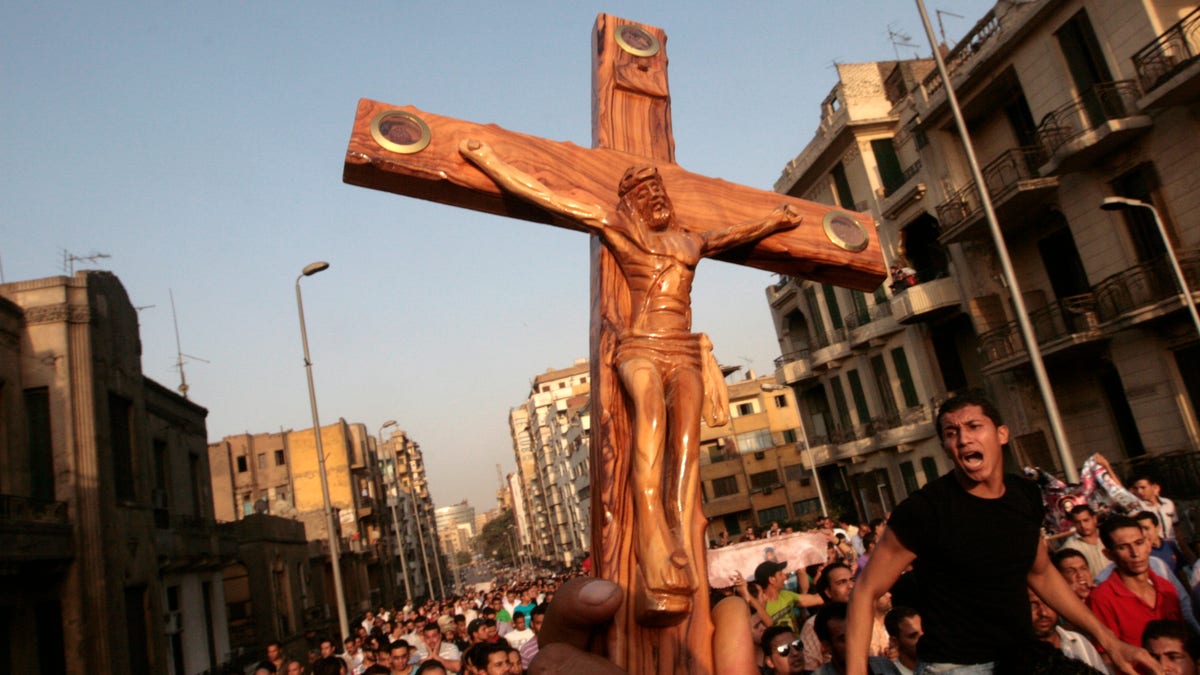
Angry Egyptian Christians protest outside St. Mark's Cathedral against the military ruling council in Cairo Egypt, Monday, Oct. 10, 2011 a day after at least 24 people were killed when Christians, angered by a recent church attack, clashed Sunday night with Muslims and security forces outside the state television building in central Cairo. (AP2011)
CAIRO-- A leading international rights group has warned of a cover-up by the Egyptian military in the investigation of the killing of more than two dozen mostly Coptic Christian demonstrators in the deadliest single incident since the February overthrow of President Hosni Mubarak.
The New-York based Human Rights Watch called Tuesday for the independent investigation of the October 9 deaths of 27 people, mostly Christian, in front of Cairo's state TV building in the Maspero district along the Nile. Military vehicles were filmed running down protesters.
The group also urged authorities to transfer investigation of the case from military to civilian prosecutors.
"The only hope for justice for the victims is an independent, civilian-led investigation that the army fully cooperates with and cannot control and that leads to the prosecution of those responsible," the HRW said in a statement.
Egypt's military council composed of top army generals took power on Feb. 11 when Hosni Mubarak stepped down, ending the country's 18-day mass uprising. The generals have pledged to eventually yield power to an elected civilian government.
However, activists charge that the military during its time in power has cracked down on discontent in a manner reminiscent of Mubarak. The generals have urged an end to street protests and seem particularly sensitive to any criticism of the army.
The generals have portrayed the October 9 protest and the ensuing bloodshed as the work of provocateurs, thereby shielding the soldiers present from any blame.
The HRW statement reflects fears by activists that an army-controlled investigation may simply back up the official story, and may even seek to make scapegoats of some of the protesters.
Some 28 people were arrested in the aftermath of the killings. Most of the names are of Christians. There have been no reports so far of arrests of soldiers involved in the incident.
"The generals seem to be insisting that they and only they investigate the Maspero violence, which is to ensure that no serious investigation occurs," said HRW spokesman Joe Stork. "The military has already tried to control the media narrative, and it should not be allowed to cover up what happened on October 9."
The group also urged an investigation into whether the military manipulated the media and the state television coverage on Oct. 9 which "may have amounted to incitement to violence."
As protesters marched towards the TV building, state television called on viewers to rush to the army's rescue, casting the Christians as a mob seeking to undermine unity between the people and the military.
Egypt's military rulers have signalled since the killings that they might move to address some long-standing Christian grievances.
On Monday, the state media reported, the head of the ruling military council Field Marshal Hussein Tantawi met with Pope Shenouda III and promised to resolve issues related to the construction of churches. Attacks on a newly-repaired church in southern Egypt sparked the Christian protests which turned deadly on Oct. 9.
A pre-20th century law forbids Christians, who are estimated to number 10 percent of the population, from building or repairing churches without receiving special permission from Egypt's rulers.
This law lies at the root of much tension between the military and Christians, with Egyptian presidents from the 1960s on carefully rationing church-building licenses to gain leverage with the Coptic church.
The Egyptian cabinet said it will issue a new law to regulate construction of churches, a move that would risk antagonizing some conservative Muslims.
But even as they make this overture to the church, Tantawi and his fellow officers have avoided shouldering any blame for the bloodshed of Oct. 9.
